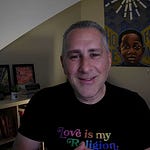Welcome back to ‘So, WTF am I supposed to do?’.
You know that moment when you’re lost in a shopping center and you find a map with the words “YOU ARE HERE”? That simple phrase tells you where you are, and knowing that is the first step to knowing where you’re headed.
The same is true in activism. Real estate agents say, “location, location, location,” and in many ways, activism follows the same rule. Where you live—your town, your block, your grocery store, your kids’ school—is where your greatest agency lies.
We tend to romanticize far-off causes or national-level movements. But change begins right here.
Your ZIP code isn’t ordinary. It’s your training ground, your base camp, your front line.
Reframing Where You Are
Sustainable activism begins with a commitment to your own geography. That means being present in your community: meeting neighbors, showing up to local gatherings, understanding the challenges around you, and connecting with people already doing the work.
People often ask, “What should I do?”, but unless we understand your specific context, we can’t say. You already have the local perspective necessary to make a difference where you are.
Remember: the national and global systems are the last and hardest to change. But you can make measurable change in your neighborhood right now.
“All politics is local.” — Tip O'Neill
Your school board influences book bans. Your city council decides policing policies. Your mayor can change housing and zoning regulations. Your neighbor’s child may be the one whose rights are being debated—and you might not even know their name.
“Proximity creates empathy. Proximity creates clarity.” — Bryan Stevenson
Being close doesn’t make something smaller—it makes it more human.
Your Relationships Are Your Activism Network
You already know people:
- Neighbors
- Co-workers
- Classmates
- People from your place of worship
- Baristas, delivery drivers, teachers
These aren’t background characters, they’re potential allies.
Every simple exchange builds trust, and trust is the currency of real movement. What if the group you’re looking for is already sitting at your dinner table?
We often confuse proximity with community. But real change happens when we recognize the relationships around us as resources.
ZIP Code Actions That Matter
Here are local ways to live your values:
- Attend a school board meeting.
- Post signs in your window or yard.
- Start a “Porch Circle” or community gathering.
- Offer your space for meetings.
- Volunteer at local organizations.
- Host letter-writing or phone banking nights.
- Share information about local elections with your network.
Your influence doesn’t depend on how loud you are; it depends on how trusted you are.
You Are An Expert on Your Community
It’s tempting to believe that the “real work” is happening somewhere else. But your neighborhood isn’t random. You’ve been planted there, and your roots make you uniquely equipped to lead from that soil.
You already understand your community’s backstories, challenges, and people in a way no outsider could.
Final Thoughts
“We live in a world in which we need to share responsibility…” — Fred Rogers
Take a walk around your block today and ask yourself, “What’s happening right here that needs justice?”
Look at your people. Your places. Your patterns.
Don’t wait to do the biggest thing. Start with the closest thing.
Going Further:
Key Concepts
• Your physical location and daily routine are essential parts of your activism.
• Activism begins in the spaces and relationships you already inhabit.
• Proximity to issues builds empathy and clarity.
• Relationships are your most powerful tool for change.
• You were planted where you are for a reason, and your impact begins close to home.
Practical Actions
• Walk around your neighborhood and take note of visible needs or injustices.
• Introduce yourself to a neighbor you don’t know.
• Attend a local school board or town hall meeting (many are online).
• Start or join a community group that is focused on shared values (e.g., book club, call night).
• Put up a sign or message of solidarity in your yard or window.
• Connect with one local organization doing justice-related work and ask how you can support.
Journal Prompts
• What do I know about the history, needs, and demographics of my town or neighborhood?
• How have I seen injustice or inequality show up in my zip code?
• Who are my natural allies or existing relationships I could build with?
• What’s one issue in my local community I’d like to learn more about?
• Where have I been waiting for change to come from far away instead of close by?
Quotes
• “All politics is local.” — Tip O'Neill
• “Proximity creates empathy. Proximity creates clarity.” — Bryan Stevenson
• “We live in a world in which we need to share responsibility…” — Fred Rogers












Share this post